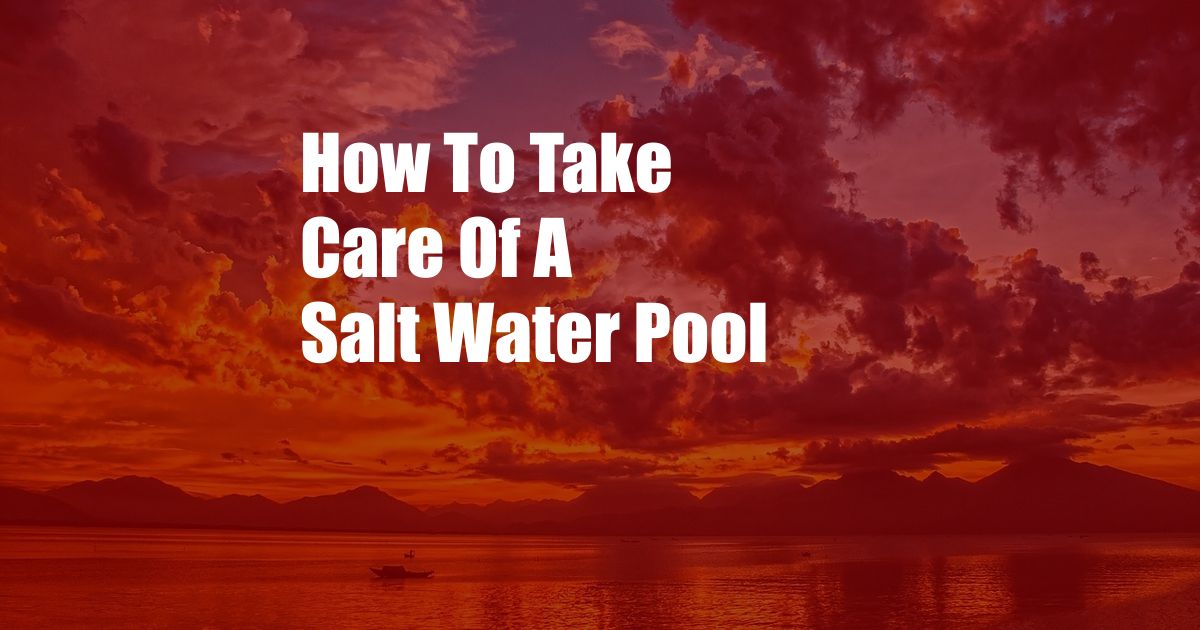
Salt Water Pools: A Comprehensive Guide to Care and Maintenance
As a longtime saltwater pool owner, I’ve learned firsthand the joys and challenges of maintaining this unique aquatic environment. The refreshing, chlorine-free experience is unbeatable, but achieving that sparkling water requires a tailored approach.
Saltwater pools rely on a combination of salt and a chlorine generator to sanitize the water. This process produces free chlorine, which effectively kills bacteria and other contaminants. By understanding the unique characteristics of saltwater pools, you can ensure they remain pristine and inviting throughout the season.
Saltwater Pool Maintenance: A Chemical Balancing Act
Maintaining proper chemical balance is crucial for saltwater pool health. Here are the key elements to watch:
- pH Levels: Ideal pH levels for saltwater pools range from 7.4 to 7.6. Too low and the water becomes acidic, corroding pool equipment. Too high and scale buildup can occur.
- Total Alkalinity: This measures the water’s ability to neutralize acids. Optimal levels protect pool surfaces from etching.
- Calcium Hardness: Proper calcium levels prevent damage to plaster and prevent cloudy water.
- Salt Level: The chlorine generator relies on salt to produce chlorine. Maintain a salt level between 2,500 and 3,500 ppm.
- Free Chlorine: Free chlorine is the active sanitizer, so regular testing is essential to ensure adequate levels (1-3 ppm).
Equipment Maintenance for Pristine Water
Beyond chemical balance, regular equipment maintenance is vital for proper saltwater pool function:
- Chlorine Generator: Inspect the generator regularly, ensuring proper salt conversion. Clean the cell as needed.
- Filter: Keep the filter clean by backwashing and cleaning the filter cartridge or DE.
- Pump: The pump should run continuously during pool operation. Check for leaks and lubricate bearings as necessary.
- Saltwater Cells: Replace the saltwater cells every 2-5 years, depending on usage.
- Salt Test Strips: Use test strips to monitor salt levels and pH regularly.
Tips and Expert Advice for Saltwater Pool Owners
Here are some invaluable tips and expert advice to keep your saltwater pool sparkling and safe:
- Brush and Vacuum Regularly: Remove dirt and debris to prevent algae growth.
- Use Chemical Floaters: These devices slowly release chemicals, maintaining constant water balance.
- Cover the Pool: When not in use, cover the pool with a tarp to prevent evaporation and contamination.
- Shock the Pool Weekly: Add a chlorine shock to kill bacteria and oxidize contaminants.
- Test Water Regularly: Use a test kit to monitor chemical levels weekly and adjust as needed.
Enlist the help of a professional pool service if complex issues arise or if you prefer peace of mind. They can handle maintenance, repairs, and chemical adjustments, ensuring your saltwater pool remains an oasis of enjoyment.
Frequently Asked Questions: Saltwater Pool Concerns
Q: Is saltwater pool water really chlorine-free?
A: While saltwater pools do not use traditional chlorine tablets, they still utilize a chlorine generator that produces free chlorine for sanitation.
Q: How often should I clean my saltwater pool filter?
A: Backwash the filter regularly, especially during high usage periods. The frequency depends on pool size, usage, and debris load.
Q: What is the ideal saltwater pool temperature?
A: The recommended temperature range for saltwater pools is between 78°F and 84°F.
Conclusion: Enjoying the Benefits of Saltwater Pools
Saltwater pools offer a refreshing and cost-effective alternative to traditional chlorine pools. By understanding the unique maintenance requirements and implementing the tips and advice outlined in this comprehensive guide, you can ensure your saltwater pool remains a sparkling sanctuary for years to come.
Do you enjoy the benefits of a saltwater pool? Share your experiences and ask any additional questions in the comments section below.